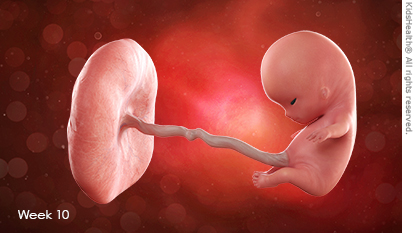Pregnancy at 10 Weeks: Weekly Calendar
Your Baby's Development at 10 Weeks
What Are My Baby’s Weight and Size at 10 Weeks?
When you are 10 weeks pregnant, your baby is growing rapidly every day. At 10 weeks, babies are about the size of a strawberry and around 1.3 inches (3.2 cm) long. Your little one weighs about 1.2 ounces (35 g). Your baby is also moving around. You probably can’t feel movements just yet, but you may be able to see them on the ultrasound.
Development Milestones at 10 Weeks
In the 10th week of pregnancy, changes are happening on the inside and outside of your baby’s body. The vital organs have been formed and begin to work together. Baby’s fingers and toes separate. Inside, tooth buds form.
The jawbone is forming what will become that cute little “baby face.” Other bone development is also happening. Your baby’s bone cells are replacing softer cartilage.
This time marks the end of the embryonic period — in general, the embryo now has a distinctly human appearance. Starting next week, your baby will officially be considered a fetus.

Your Body When You're 10 Weeks Pregnant
Pregnancy Symptoms at 10 Weeks
If you’ve had morning sickness, it may be starting to taper off by now, but for some people, it continues through the first trimester. Some weight gain is normal, and your clothes and undies may feel tight. Relaxed clothing — pants with elastic waistbands and loose shirts, or even maternity clothes — may be more comfortable for you.
At 10 weeks pregnant, it’s also normal to have:
Important Appointments at 10 Weeks
Good prenatal care is crucial for your health and your baby’s health. If you haven’t already, schedule your first prenatal visit.
If your pregnancy is considered high-risk (for example, if you are older than 35 or have a history of pregnancy complications), your doctor may want to see you as early as possible and more often during the course of your pregnancy.
What Can I Expect at My First Prenatal Visit?
At your first prenatal visit, the doctor or nurse practitioner will confirm that you’re pregnant and estimate your due date (when your baby might be born). This date is based on when you had your last period. Sometimes a prenatal ultrasound (a test that uses sound waves to make a picture of your baby) can help figure out the due date.
The doctor will do a physical exam to check your health and may want to do prenatal tests. Prenatal tests check your health and your baby’s health. Some are screening tests that can only show the chance of a problem. Others are diagnostic tests that can find out if your baby has a certain problem.
At your first appointment, the doctor also will:
- discuss your health history
- discuss prenatal vitamins, lifestyle, and nutrition recommendations
- establish a prenatal care plan
- address questions and concerns
Common Blood Tests Around 10 Weeks
While you’re pregnant, prenatal lab work — like blood tests — is offered during the first trimester (weeks 1–12), second trimester (weeks 13–27), and third trimester (weeks 28–40).
Your provider will probably send you for a blood test to find out whether you're immunized against varicella and rubella (German measles), and to find out your blood type and Rh factor. You also may be tested for certain infections, such as syphilis or hepatitis B, and you may be offered an HIV test.
Bloods tests for certain genetic disorders also may be given. The type of tests offered will depend on your situation and preference.


 Note: All information is for educational purposes only. For specific medical advice,
diagnoses, and treatment, consult your doctor.
Note: All information is for educational purposes only. For specific medical advice,
diagnoses, and treatment, consult your doctor.